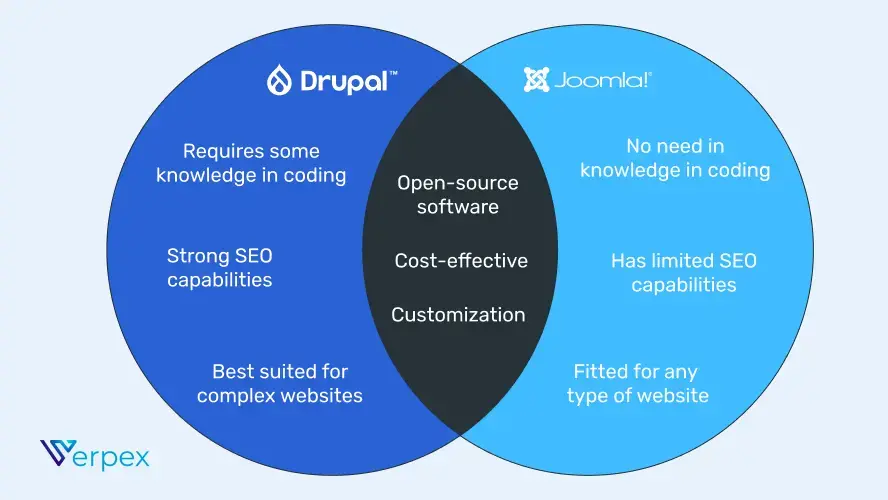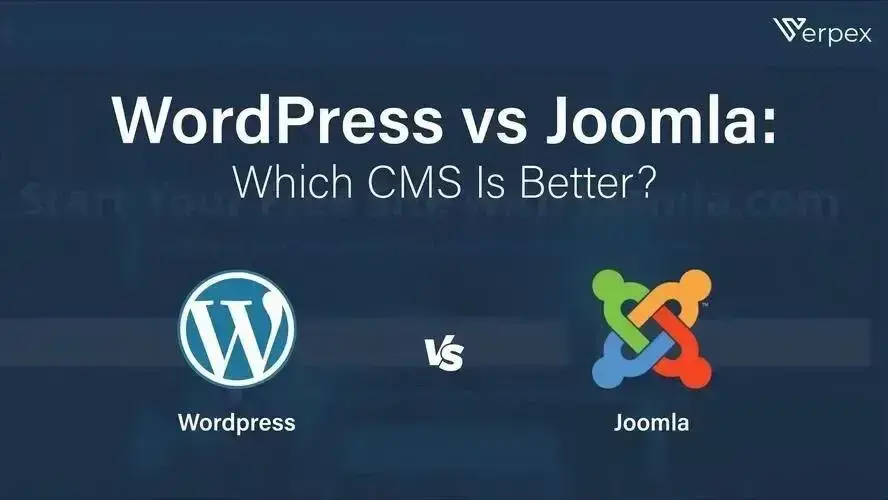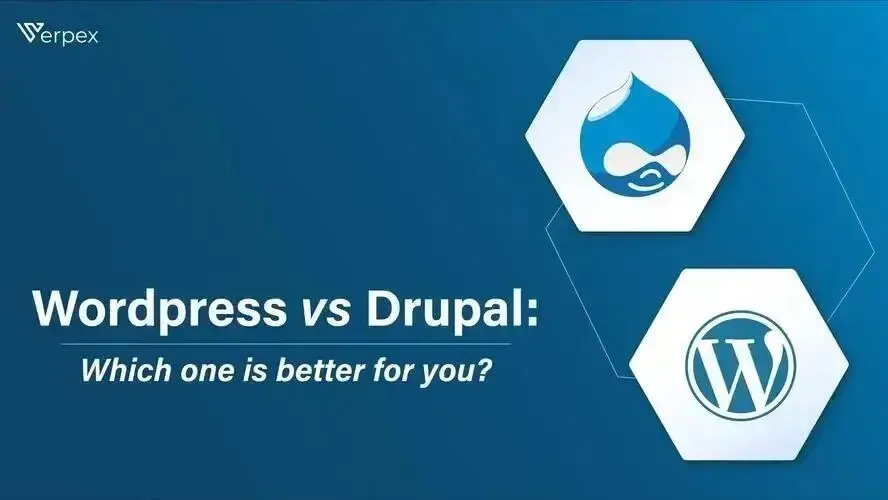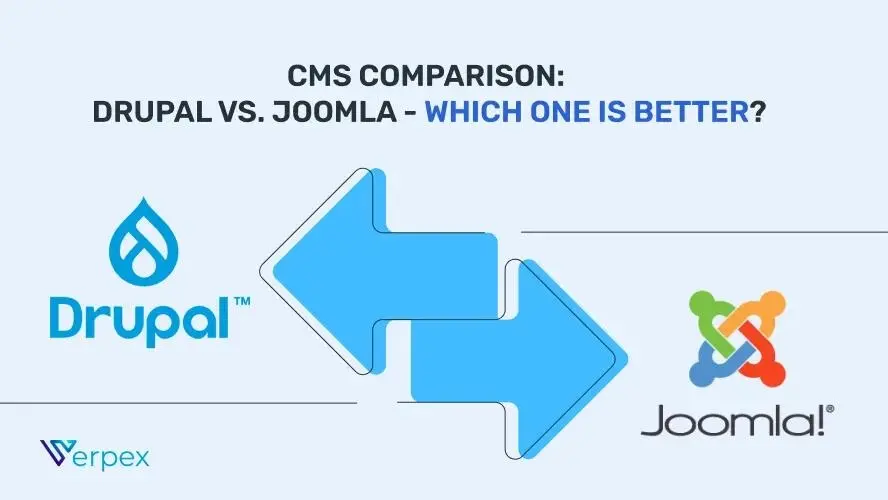If you’re thinking about building a blog or a website, you should consider using one of the best Content Management Systems that are available on the market: Drupal and Joomla.
In this post, we will look through the two popular CMS and compare them, in order to help you in making the right decision.
What is Drupal and what is Joomla?
Joomla is an open-source software launched in 2005, and it’s worth mentioning that when it comes to popularity, Joomla is second to WordPress. Joomla powers 2.1% of all websites and it can be used to create almost any type of website.
Drupal is also an open-source software, but it was launched in 2001, making it a bit older than Joomla. Drupal powers 1.4% of all websites and its sites are highly stable and secure. People use Drupal to create websites in every sector, such as political websites, corporate sites, and personal blogs.
Drupal vs. Joomla: Brief Comparison

Drupal vs. Joomla: Common Features
Open-source software – Both platforms are open-source software and are projects that are community driven.
Cost-effective – Joomla and Drupal allow its users to quickly and easily setup a site while managing to stay cost-effective.
Customization – Both websites use themes and templates for visual appearance of the sites, as well as extensions and modules for extending features.
Drupal vs. Joomla: Key Difference
Skill level – Generally, Drupal is viewed at a platform for people who have some knowledge in coding and like to get into the technicality.
SEO-friendliness – Joomla has limited SEO capabilities, while Drupal has strong SEO capabilities.
Website type – Joomla is fitted for any type of website, while Drupal is best suited for complex websites thanks to its strong API.
Drupal vs. Joomla: Elaborated Comparison
(metrics one by one)
- Popularity
- Type
- Installation
- Search Engine Optimization
- Ease of use
- Security
- Content Manager
- Themes & Templates
- Plugins & Extensions
- Top websites using platforms
- Support
1. Popularity
While WordPress holds the first spot in popularity by powering 41.5% of websites, still both Drupal and Joomla are very popular. Joomla and Drupal are two relevant platforms that are stable and powerful. As we previously mentioned, Joomla powers 2.1% of all websites, while Drupal powers 1.5% of all websites, falling behind only 0.6%.
In conclusion, Joomla is in the lead in the popularity round. Joomla owes its popularity to the fact that anyone with little computer skills can create and maintain a website, while Drupal is popular thanks to its advanced tools and its ability to create complex websites.
2. Type
Both of these platforms are free open-source software. Joomla is a great platform if you’re looking to set up an eCommerce website or a social network website, since it is designed as a community platform with strong social networking features.
Drupal on the other hand, is best for those who want to organize, tag, and categorize complex content. If you’re looking to create a website that requires scalability and you want the site to be highly customized, Drupal is a great choice.
Both CMSs offer great options, it all depends on what kind of website you’re going for.
3. Installation
Joomla’s installation is pretty straightforward. Besides that, many hosting providers offer one-click install packages for Joomla.
Drupal’s installation is similar to Joomla’s. You just download and upload the package and you run the installation script. One thing that Drupal offers is pre-packaged bundles that have specific configurations and modules which you can use in order to create a specific type of website.
All in all, Joomla and Drupal are similar when it comes to their installation, you can do it using a one-click installer or manually in about 10 minutes.
4. Search Engine Optimization
Joomla has the ability to rank your website extremely high, but it does require the most careful cultivation and manipulation, thus it ends up being not very user-friendly. Any beginner might have to struggle to get the right SEO for his website using Joomla.
Drupal has many pre-ready capabilities that make it very competitive. Drupal offers in-built catching for really fast page load time, which affects your website’s SEO. Drupal’s themes are also very responsive and it looks good on PCs, tablets, and smartphones.
When it comes to SEO, Drupal comes first.
5. Ease of use
If you’re looking for a CMS that will help you build a website by giving you flexibility without being too difficult to learn, Joomla is a great choice. Joomla is an excellent balance between offering a wide range of features and making it easy to navigate those features. On the dashboard you can find loads of options, and figuring out how they all work is pretty simple.
Oppositely, the Drupal dashboard doesn’t look so beginner-friendly. To navigate it, you will need some knowledge in coding or, to go through some tutorials.
Joomla has an edge when it comes to beginner-friendliness.
6. Security
When choosing a CMS, security plays a very important role. There is no question that Drupal has the best security between the two, since Drupal has a very serious approach when it comes to security. As the discover and patch security vulnerabilities, they publish the news on their own website. This platform has way less untrustworthy themes and plugins, and you can tell that Drupal paid incredible attention to the security of its modules and codes.
Joomla is also proactively secure, but it doesn’t enjoy the same reputation that Drupal has when it comes to security.
7. Content Manager
Besides being easy to use, you will want a CMS that will offer you many options to manage your website. Completing your day-to-day tasks and working on your website shouldn’t be much of a fuss.
Joomla gives you a lot of settings you can customize, like setting up multiple languages, configuring your caching settings, enabling CAPTCHAs, tweaking your site’s SEO and so on.
Drupal, however, goes one step further. Drupal has lots of advanced management options, for instance it stores the queries that people look for on your site. Overall, Drupal includes more in-depth settings for content management.
8. Themes & Templates
Drupal’s official site has a broad collection of themes, to be precise they have over 2,500 free themes to choose from.
Joomla has a theme system, so changing the appearance of your website is relatively easy. However, Joomla doesn’t have an official template directory so you’ll need to use third-party theme maker’s websites and look for options on your own.
Both CMSs are highly customizable, but Drupal is in the lead in this aspect.
9. Plugins & Extensions
Both Joomla and Drupal offer the option to install new features on your sites. Drupal calls them modules, while Joomla calls them extensions, but their purpose is the same – to extend the features that comes with your CMS.
Drupal has over 39,000 modules in its official directory, and a few more available from third-party developers.
Joomla has about 8,000 extensions in its official directory, and a couple of hundred more elsewhere on the web.
Joomla takes the win this round, since it offers a good catalog of extensions that aren’t so developer-focused like Drupal’s.
10. Top websites using platforms
Some popular websites that use Joomla are: The Fashion Spot, The Hill, Harvard University, IKEA, Lipton Ice Tea, Holiday Inn, and Guggenheim.
Drupal, on the other hand, is used by: Tesla, The Emmy Awards, The Australian Government, NCAA, Le Figaro, Keap, Mint, Entertainment Weekly.
As we can see from the websites that use Drupal, many institutions and government agencies have trusted this platform, thanks to its strong focus on security.
11. Support
When it comes to support, both of these platforms offer some type of help if you’re struggling with a certain task.
Joomla has a couple of sections on its website where you can find different forms of help. There are user forums, the community portal and training, and there’s the main documentation.
Drupal handles this aspect similarly, by offering various user guides and tutorials, community portal, and documentation. Drupal tries to connect users to companies and developers that offer Drupal services through the Drupal Marketplace. In this aspect, Drupal might be in the lead only for having a bigger community.
Pros and Cons of Drupal
Advantages of Drupal
Disadvantages of Drupal
Pros and Cons of Joomla
Advantages of Joomla
Disadvantages of Joomla
How to Get Started with Your Favorite CMS
To get started with your favorite CMS, you will need a domain and web hosting. Both of these services can be found at Verpex.
What Other CMS Are There?
When picking out the right CMS for your website, make sure you’ve explored your options and know everything you need to make the right decision.
WordPress vs Joomla
WordPress has a huge global community, a wide selection of plugins and themes, and it’s fairly easy to use. Joomla on the other hand, is great for building extensive product catalogues and online forums.

WordPress vs Drupal
WordPress dominates the web in terms of market share, and it doesn’t show signs of slowing down. However, Drupal’s functionality goes a lot deeper than WordPress.

Summary
If you’re looking to create a website that is highly customizable, Drupal should be your first choice. Drupal should also be your go-to platform if you want to give priority to the security of your website. Keep in mind that Drupal is not the best choice for beginners, since they have no prior experience with coding.
Joomla can be handy if your website is managed by multiple people, thanks to its advanced user management scheme. Joomla also offers multilingual support. When compared to Drupal, Joomla is a bit more beginner-friendly, which makes it perfect for novices.
Frequently Asked Questions
How does Joomla work?
When compared to a car, Joomla would be the engine. Through a series of commands and scripts (wires and cables) it pulls data (fuel) from the database requested by the user (driver), which allows the car to move.
Does Acquia own Drupal?
No, Drupal is a free software that belongs to the world. The founder of Acquia, Dries Buytaert, invented Drupal.
What are featured items in Joomla?
Joomla has Features Articles, which is a component that generates intro text of selected content into a desired layout.
Do I need a MAC or a special PC to use a CMS?
No, you don’t. Any computer with a web connection and an installed browser should be just fine.

I've been navigating the web hosting waters for years now. As the Chief Editor at Verpex, I team up with some awesome writers to dish out the good stuff on hosting. Got a Master's in Journalism, so I always have an eye out for quality. Whether you're just dipping your toes or you're a seasoned surfer, I'm here to make everything web hosting feel like a breeze
View all posts by Julia Lozanov

















